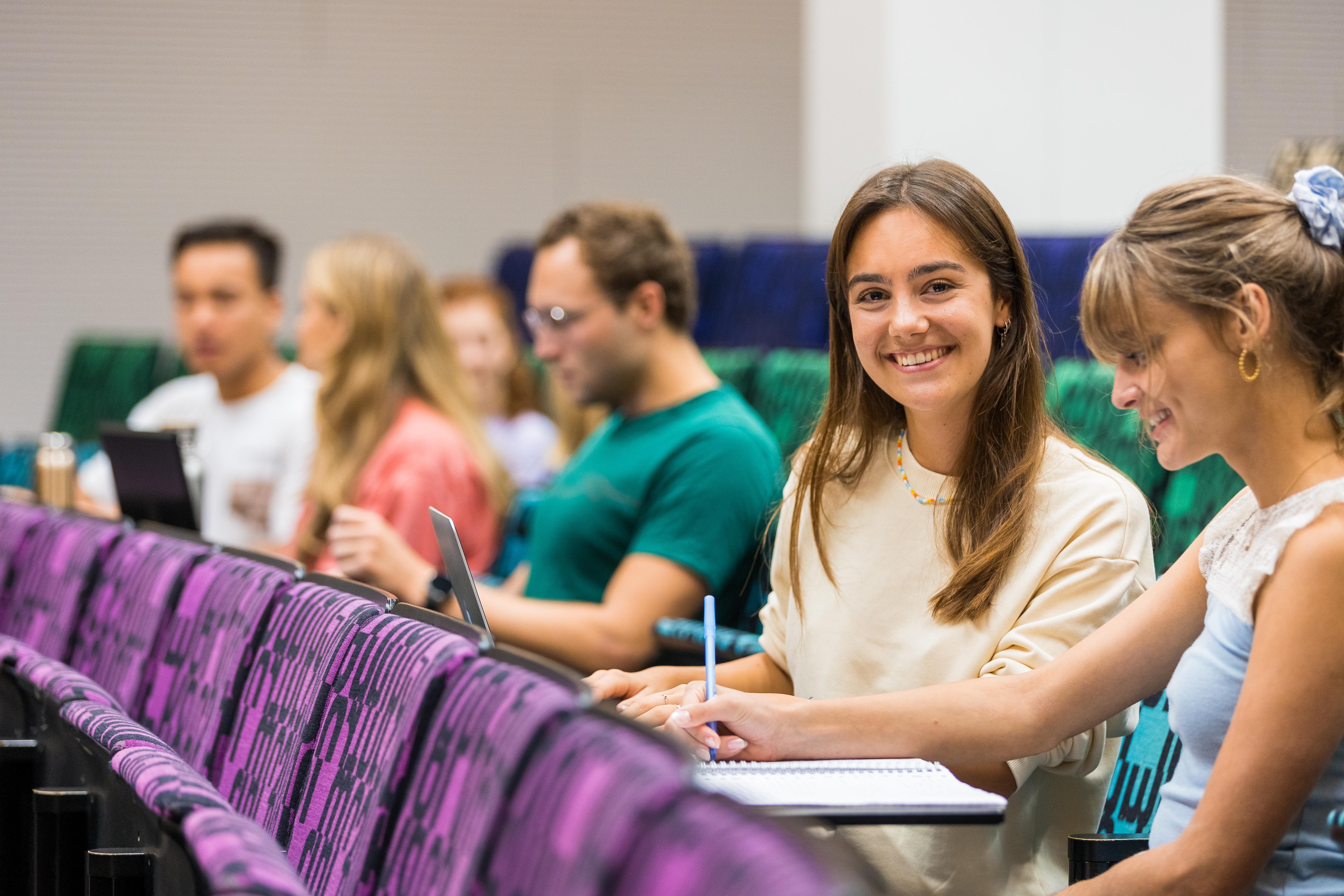Institute of Psychology




E-mail: assessor@fsw.leidenuniv.nl
Dear new student,
Welcome! As you are reading this, you are at the beginning of your studies at the Faculty of Social and Behavioural Sciences (FSW). Here, we learn and research about how society works and what role people play in it. We are delighted that you’ve joined us on this journey! Since there is a lot coming your way and you might have many questions, this booklet contains (almost) all the information you need to start your studies in the best possible way.
The first weeks of your studies are both exciting and scary. I still vividly remember being in your shoes about four years ago. Now that I am a master’s student, I can say with certainty that I have fully found my place at our faculty. As the new assessor (student member) of the Faculty Board, I find it especially important that you and your fellow students are seen and heard. Therefore, I am particularly curious about your experience of our faculty, so feel free to email me with comments or suggestions in the coming years. Or give me a shout in the corridors!
Don’t worry, you don’t have to start changing the world or our faculty right away. In fact, first and foremost it is important that you start to feel at home with us in the coming months. So take your time to find your place and meet your fellow students, lecturers and all the other members of our community. I look forward to getting to know you and wish you lots of fun as you start your studies!
Robin Buijs Assessor
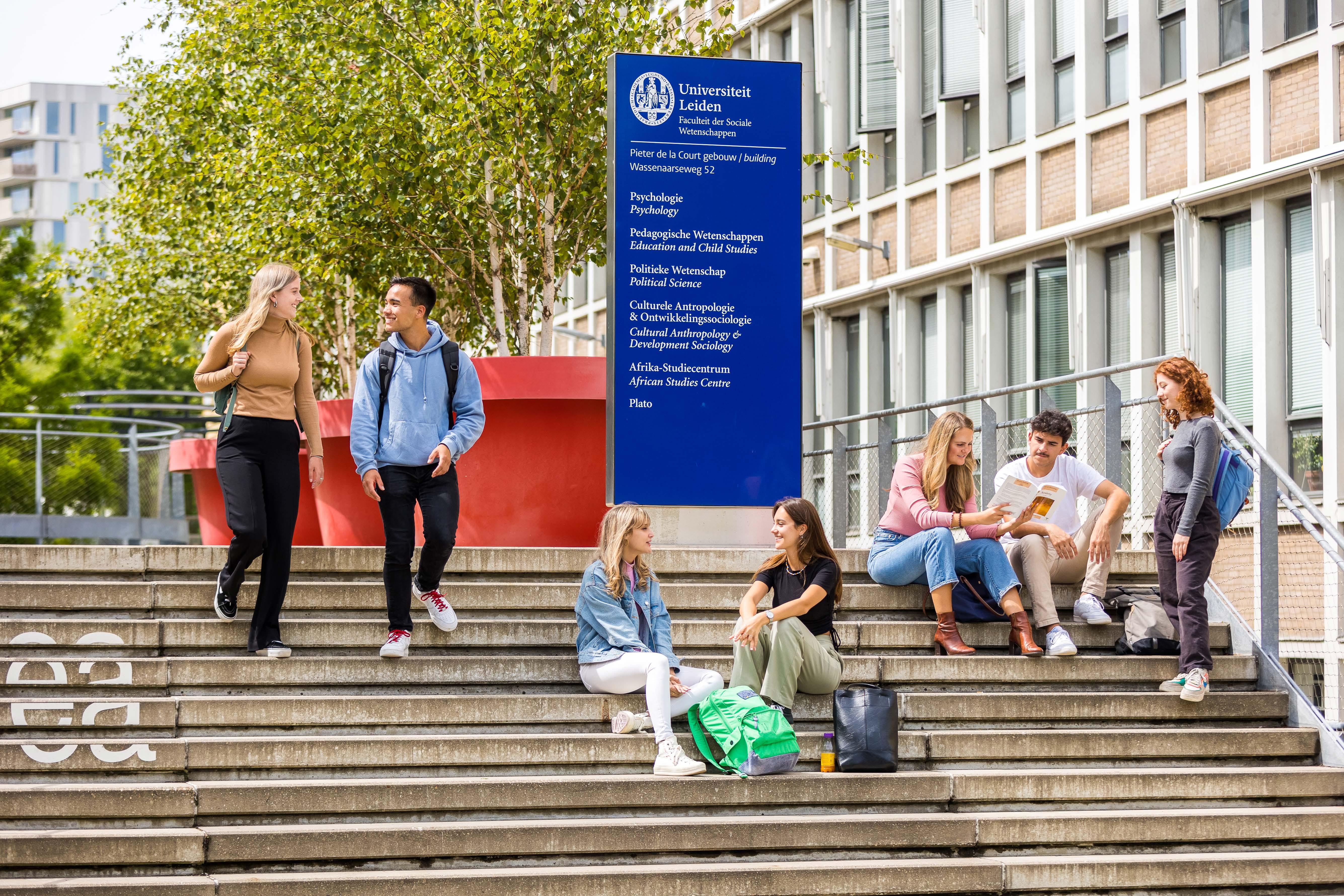
The main building of the Faculty of Social and Behavioural Sciences is housed in the Pieter de la Court Building.
• Wassenaarseweg 52, 2333 AK Leiden
• Opening hours
C
losing days
• Monday 2 October and Tuesday 3 October (Leidens Ontzet)
• Monday 25 December 2023 - Monday 1 January 2024
• Friday 29 March 2024 (Good Friday)
• Monday 1 April 2024 (Eastern)
• Thursday 27 April 2024 (King’s Day)
• Thursday 9 and Friday 10 May 2024 (Ascension Day)
• Monday 22 May 2024 (Whitsun)
• Yearly calendar
In the building the rooms are marked with four characters:
• The first one is which floor you are on
S = basement, 1 = first floor, and so on
• The second one is A or B
- the left side of the building is A, which is the side of the restaurantthe right side of the building is B, which is the side of the library
- the sides and rooms connected to the central hall are C
• The last two numbers indicate the number of the room.
More about studying at Leiden University
• student.universiteitleiden.nl/en/
Stay up to date!
• Website:
universiteitleiden.nl/eng/social-behavioural-sciences
• InstagramFSW: leidensocialsciences
• FacebookFSW: fswleiden
• LinkedinFSW: Faculty of Social and Behavioural Sciences
• InstagramPsy: leidenpsychology
All students enrolled at Leiden University are required to have an LU-Card, which will give access to all university facilities, including all university libraries and printers.
Leiden University students get a ULCN-account (ULCN = Universiteit Leiden Community Network) which gives you access to PCs, uMail, the digital learning environment Brightspace, digital library (uLip), uSis and MyStudymap.You need your ULCN-account to register for courses and exams in MyStudyMap.
Your Leiden University email address (uMail) will be used by lecturers and others to contact you. For that reason, it is very important to check your uMail regularly! It is possible to forward your uMail to your regular private email address. Please be sure to also check your spam folder.You can find more information about uMail and mail-forwarding here.
You will need your ULCN-account to get access. You can use MyStudymap to:
• check your schedule;
• enrol and unenrol for examinations, tutorials/seminars and courses;
• retrieve examination results.
When you retrieve your examination results, you will see both your grade and the number of credits. You will also see any results you have obtained elsewhere if they have been passed on to your Institute.
Don’t have access to MyStudyMap? If so, please contact the education service centre.
On uSis you can keep track of your study progress, exam results and study requirements. You will need your ULCN-account to access the platform. You can use uSis to:
• submit petitions (e.g. for exemptions);
• reviewing your study results and study requirements.
To find uSis go to: usis.leidenuniv.nl. Login with you ULCN account and personal password. If you still have questions contact the Student Services Centre (page 7).
The student’s website is an important source of information for students about everything that is going on in the University. Check it out to keep up with the latest university news, but also to find practical information about your studies, administrative matters, student life, careers, and the University’s organisational structure. In addition, the agenda lists courses and workshops you can take part in. And the website is also where you will find the latest updates. So make sure to check it regularly!
The Prospectus contains information about all the courses in your study programme. Here you can find detailed descriptions of courses, including the teachers, the schedule and the reading material.
The digital learning environment of Leiden University is called Brightspace. Each course you take will have its own Brightspace page, where you can find all kinds of information about the course, such as the timetable, reading lists (including lists of required reading), slides from lectures, announcements, and assignments. Teachers will assume that you check Brightspace regularly to keep up to date. If any updates are made to the course content, you will receive a notification in an email message – this will help you keep track.
Go to the Brightspace homepage. Log in using your ULCN-account and your personal password. On the left you will see the list ‘My Courses’. These are the courses you currently have access to. If a course is not visible (or grayed out) in the list, then this course is not yet available in Brightspace.
You enrol for a course through MyStudymap. If you have registered for a course in MyStudyMap, you will also be given access to the course in Brightspace (once it becomes available). Are you a full-time first-year bachelor’s student, are you following a pre-master programme, or are you
following courses whilst being registered at another Dutch university? If so, different enrolment procedures apply.You will receive further information by email.
There are plenty of manuals available. You can access these manuals using the help links in Brightspace itself (in the blue bar under HELP).
In this app, you can find all your personal study information in one place. Log in once and access your timetable, grades, PC availability and the latest news, anytime and anywhere.
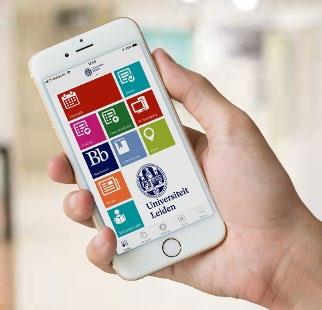
You can contact the Student Services Centre (SSC) for practical questions about your studies. The SSC can help you with:
• registration for courses and exams;
• transcript requests;
• questions about petitions;
• questions about your course history in uSis;
• information on diplomas and graduation;
• other questions - the SSC is the front office for students, so please don’t hesitate to contact us if you are not sure where to go.
The SSC has a digital colleague called OSCar. You can find OSCar on the university’s website, where it will gladly answer your questions.
• Red counter (left) on the ground floor
• Check the current opening hours on the website
• ssc@leiden.edu
• Student Services Centre
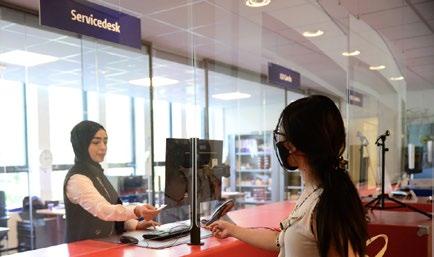
The Service Desk can help you with:
• booking lecture rooms (if necessary with audiovisual and ICT equipment), for instance if you need to discuss an assignment with your fellow students;
• borrowing cameras and voice recorders;
• reporting problems with printers or your LU-Card.
• Red counter (right) on the ground floor
• 071-527 8989
• servicedeskfsw@ufb.leidenuniv.nl
The ISSC computer helpdesk provides help with ULCN-accounts and problems with hardware and/or software in the computer rooms.
• Red counter (right) on the ground floor next to the Service desk
• 071-527 8888
• helpdesk@issc.leidenuniv.nl
Audiovisual equipment (such as cameras, audio recorders, projectors) can be borrowed from the Service desk. If you have any questions about how to use the equipment, please contact the AV Services.
• 1B11
• 071-527 6536
• av-fsw@ufb.leidenuniv.nl
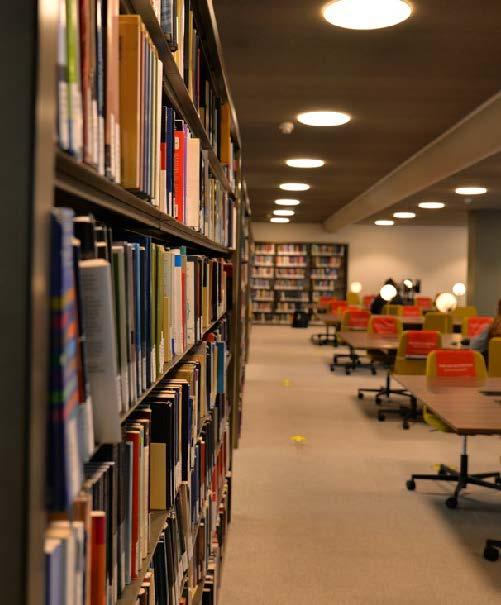
Our Copy and Print Shop offers a range of services including digital services, reprographics, posters, DTP and print work. You can also pick up your ordered readers here. These services can be requested online or by visiting the shop in person. Also, they offer a small range of office supplies.
• Red counter (right) on the ground floor next to the Service desk
• Check the current opening hours on the website
• 071-527 3614
• printshop@fsw.leidenuniv.nl
• Printing and copying
You can use the Faculty Library to borrow books, but it also provides a quiet place to study. There are 210 study places (60 with computer) and a comfortable lounge area. You need your LU-Card to borrow books. If you would like to study in the library, you can reserve a place, there are 2 time slots (9-13 and 14-18) from Monday till Friday.
• Ground floor
• Check the current opening hours on the website.
• fsw@library.leidenuniv.nl
• Library Social and Behavioural Sciences
Do you want to access the internet on your mobile phone or laptop?
Leiden University has two networks to choose from:
• Leiden University Wireless Network (LUWA). This is meant for temporary access towireless internet. Access via your Leiden University account (‘ULCN-account’).
• Eduroam. The eduroam wifi is safer because all data is encrypted and eduroam gives you wifi-access in almost all universities and universities of applied sciences in the Netherlands, Europe and further afield. Once you have installed Eduroam, your devices will automatically connect whenever you are in a Leiden University building.
To enable access to the wireless network, laptops must be equipped with an up-to-date virus scanner.
Copy, scans and print
Photocopiers/printers/scanners available to students are located all around the Pieter de la Court Building.
How to print
1. get yourself a LU-Card
2. top up your balance via the PinPoint in the central hall or onlinevia https://webprint.leidenuniv.nl/login;
3. select the printer ‘LU-Card Printer’ and print your document.
4. go to any printer in the building and scan your LU-Card. Now you can print your document.
How to make a scan
Scanning is free, but you do need your LU-Card. You can send your scans to your uMail or save them on an USB stick. You can find instructions on the printer.
In our Faculty, you will find 400 computer work spaces. They are available on floors 1 to 4 beside the stairs, and in rooms 1A26, 1A28, 1A30, 1A32, 1A46, 2B04, unless booked for courses. The computer areas in the basement are always accessible to students.
As the computer rooms are also used for teaching, you can use these computers only after making a reservation request at the Service Desk on the day.
All the computers have CD-ROM/USB-key facilities, bibliographic systems as well as the following programmes: Microsoft Office 365, Microsoft Edge, Google Chrome, SPSS en Adobe. Research software, e.g., Matlab is available in Room 1B02. Movie editing software is available in 1A.45.
In addition, students can use computer facilities in other university buildings and at the University Library (Witte Singel 27) or the Plexus Student Centre (Kaiserstraat 25).
The available computer work spaces, and how to book them can be found on the LU-app.
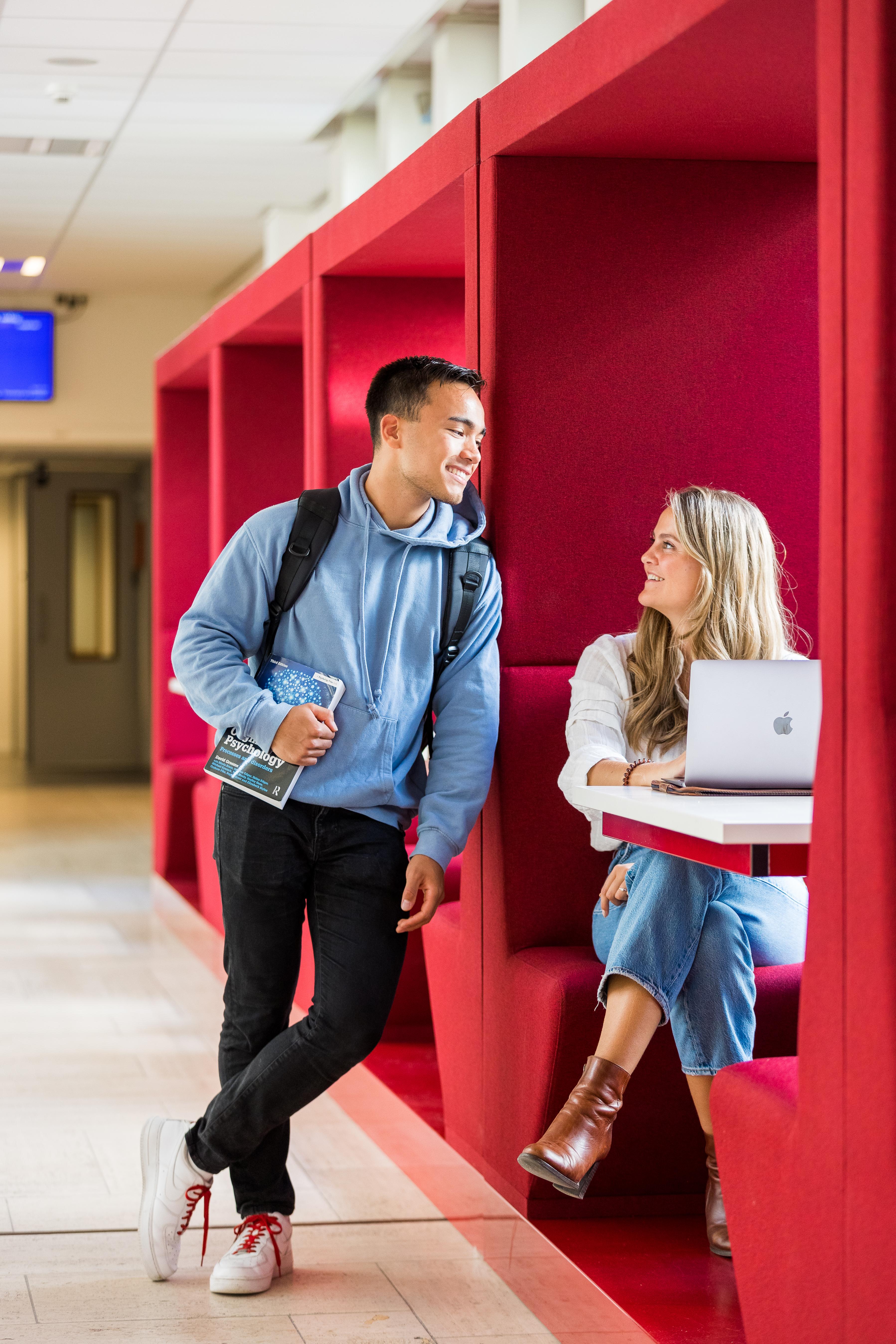
Lockers are located near the restaurant and in the library. There are also lockers on the 1st floor near room 1A20. For the 1st floor lockers you have to pick up a key at the Service desk.
You may have to go to another university building for a lecture or examination. You can look up all university locations here.
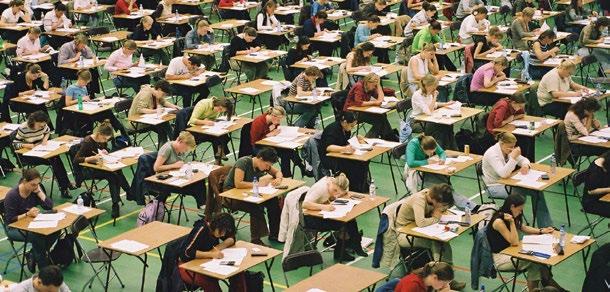
Are you a bachelor’s student looking for an extra challenge in addition to your regular study programme? Motivated and ambitious students with a wide range of interests can apply for the Honours College of our own faculty or another faculty of Leiden University. As an Honours College student, you sample a wide range of academic disciplines and meet students from other degree programmes.
Within the track offered by our faculty, Science, Society and Self, you will learn how to apply your scientific knowledge to solve social issues. You will also pay attention to your own personal and professional development.
You can start in the second semester of your first academic year or at the start of your second academic year.
• honoursfsw@fsw.leidenuniv.nl
• Honours College
The International Leiden Leadership Programme (ILLP) is an honours programme (worth 5 EC) for master students. The programme takes place from January until June. You will join a small interdisciplinary class of international students and receive feedback and guidance from an experienced coach. The ILLP has a focus on skills and personal development.
• leadership@ha.leidenuniv.nl
• Leiden Leadership Programme
Master honours classes are extra curricular, small-scale and interdisciplinary courses in which you get to know both theory and practical lessons. in September you can register for the classes that start in November. You can register for classes in the second semester in February.
• maclasses@ha.leidenuniv.nl
• Master Honours Classes
During your degree course, you can participate in decision-making and advisory processes concerning the teaching at and organisation of the Faculty. For example, you can join the Faculty Council or a programme committee.
• Website
The Study Adviser of your programme can help you with questions con-cerning:
• the content and scheduling of your programme
• your academic and study skills
• special arrangements for students with learning disabilities or special personal circumstances
• the rules regarding study delay u binding Study Advice
For contact details of the Study Adviser from your programme, see last part of this brochure.
For all questions about studying, administration, study skills, well-being, personal development, study choice, and career advice and preparation you can find more information here.
At the Student Plaza FSW you will find all study and support services in one place:
• the Student Services Centre (SSC);
• the POPcorner;
• the Career Service;
• the Community Engagement Service;
• the Honours College;
• the Personal Development Centre.
• Ground floor, behind central hall.
• Monday through Thursday from 10:00-16:00 hrs.
• studentsupportfsw@fsw.leidenuniv.nl
• Student Plaza
The POPcorner can help you with your personal development, finding your way around the faculty, making the best possible start and improving your sense of belonging.
The POPcorner offers:
• the ‘Smart studying’ walk-in clinic for practical study tips
• social studying group to study together with other students
• (online)workshops on studying effectively, planning and preparing for exams
• support with preventing and overcoming barriers that keep you from studying successfully u study tips from other students
• individual support to help you make a good start and feeling at home
• Location: Student Plaza
• Walk-in hours: Monday, Tuesday and Friday 10 a.m.-1 p.m, Thursday 10.00-13.00 and 14.00-16.00 hours
• POP_OUT Academia consultation hour: Wednesday 13.00-15.00 hrs
• Phone: 071-527 8846
• E-mail: popcorner@fsw.leidenuniv.nl
• Website: POPcorner
If you would like to have advice from a senior student you can register for our Buddy System. Your Buddy can give you advice on how to prepare for an exam or introduce you to fun activities at the university.
• buddysysteem@fsw.leidenuniv.nl
• Buddy System
The Career Service offers advice and support if you have any questions about your choice of master programme, career (academic or otherwise), and the transition to the job market. They can check your cv and LinkedIn profile, help you with your motivation letter and with finding an internship or job. You can also discuss with them what you can do during your studies to build up your cv.
The Community Engagement Service offers you advice and support if you have questions regarding relevant extra-curricular job experience, especially volunteer work.
Workshops/events
Career events and workshops are organised regularly. Check out the workshop calendar on the student website.
• Student Plaza
• 071-527 3840/8025
• slsfsw@fsw.leidenuniv.nl
• Career Zone Universiteit Leiden
• Career Service FSW
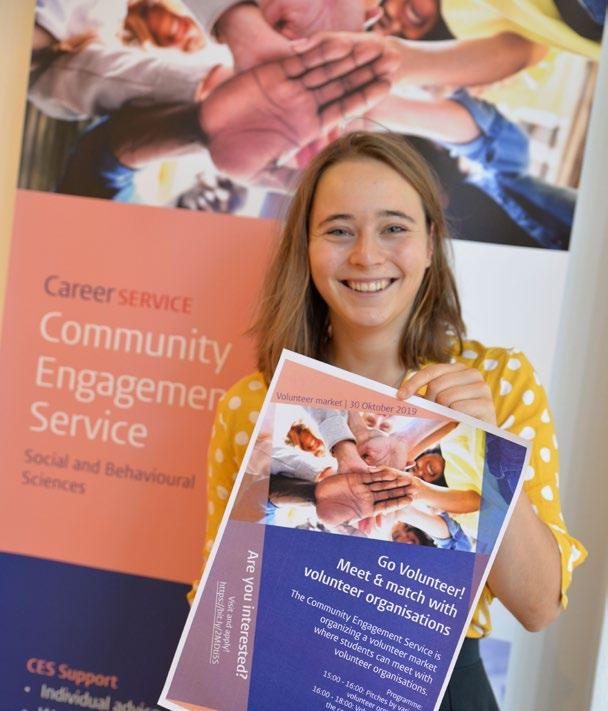
The goal of Plexus is to offer optimal services to students of Leiden University. Plexus houses the Student Information Centre help desks, the university shop, lecture rooms, meeting facilities, a gym, and other student support facilities such as the ombuds officer, Career Service, student counsellors and student psychologists. Plexus is also home to many student organisations and the Meeting Point, a centre for students with a refugee background. The International House, with its common room and range of internationally-orientated student associations, can also be found at Plexus.
• Kaiserstraat 25, Leiden
• Check the current opening hours on the website
• 071-527 8011
• Studentcentre Plexus
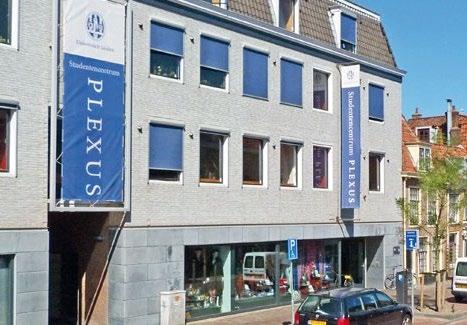
Student counsellors can answer questions and provide guidance in situations involving regulations and legal provisions. All meetings with student counsellors are strictly confidential.
You can turn to a student counsellor with any questions or problems you might have concerning:
Exceptional circumstances
• combining studying with top-level sport
• studying with a disability
• studying and pregnancy / studying with children
Academic delay
• delays to your studies caused by personal circumstances
• issues concerning binding study advice (BSA)
In cases of academic delay, first speak to your study adviser.
If you are experiencing study-related or personal problems, you can make an appointment with one of our student psychologists through the online appointment system on the website. The first appointment is a maximum of 30 minutes. For students of Leiden University, these sessions are free of charge.
• Plexus, Kaiserstraat 25 Leiden
• 071-527 8026
• psychologen@sea.leidenuniv.nl
• Student psychologists
Are you feeling isolated, lonely and anxious? Do you want to form new connections with fellow students? Join one of the Student Support Groups! You can also contact the Leiden University Student Helpline, which is available from Monday to Friday from 09:00h till 17:00h.
In addition to the Student Helpline, there is also the National Listening Phone that you can call 24/7 for a listening ear. For all these options, visit:
• Mental well-being
We strive to provide a safe and inclusive environment for our students and staff. But what should you do if you feel that these values are not respected by staff or fellow students?
• Unacceptable behaviour
• Concerning or threatening behaviour
• Improper treatment
• Academic integrity
• Malpractice
• Diversity and inclusion
The ombuds officer deals with complaints from students who feel they have been improperly treated by an university staff member or body. By improper treatment is meant treatment that is unfair, contravenes regulations, shows a lack of respect, or is experienced as unpleasant or detrimental in some way by the student.
• 071-527 3657 (if no answer 071-527 8026)
• ombudsfunctionaris@leidenuniv.nl
• Ombuds officer
The Code of Conduct is applied by Leiden University in the context of providing a safe and non-discriminatory work and study environment. The Code of Conduct applies to all contact between lecturers and students of Leiden University, both in the context of professional activities or study activities, and outside these contexts.
If you have encountered undesirable behaviour, such as sexual intimidation, aggression, violence or discrimination, you can turn to one of the confidential counsellors:
Dhr. Ramon Kuipers
• Phone: +316 1146 7783
• E-mail: rkuipers@winstonpartners.nl
Mevr. Mehrnoush Golafshan
• Phone: +316 2504 2886
• E-mail: mgolafshan@winstonpartners
Additionally, you can always confidentially contact the POPcorner FSW via popcorner@fsw.leidenuniv.nl
Fenestra Disability Centre
Studying with a disability (for example visual or physical disability, language or speech disorder, chronic or psychological illness) may require additional time and effort. The Fenestra Disability Centre gives you advice on additional support available.
• Plexus, Kaiserstraat 25, Leiden
• 071-527 8025
• fenestra@plexus.leidenuniv.nl
• Fenestra Disability Centre
If you have questions about your housing application, financial matters, contract-related issues or signing tenancy contracts, etc., you can contact th Housing Office Desk.
• Plexus, Kaiserstraat 25, Leiden
• 071-527 5330
• Housing Mentor network
The Mentor Network is an online portal that allows you to get in touch with alumni (former students of Leiden University). You ask an alumnus advice concerning career and job applications or specific information about organisations or positions.
• careerservices@sea.leidenuniv.nl
• Mentornetwork
There are two important ways in which course material is presented: via lectures, and via work groups. A work group is a small group in which you will discuss the theory more deeply. In addition to the ‘contact hours’, you are expected to spend time on independent study (reading books and articles; writing papers and preparing oral presentations).
As a bachelor’s student at Leiden University you are entitled to good education and academic guidance. In return you are expected to meet certain

academic requirements: the so-called Binding Study Advice (BSA) requirements. A student of the International Bachelor in Psychology programme is required to have completed a minimum of 45 study credits (out of 60) by the end of his or her first year of enrolment, including one of the three statistic courses on offer. This means that at the end of the first year, fulltime students receive binding advice as to whether they can continue their studies. In the course of the first year, students will be given regular feedback on their progress by the Study Advisers.
In formulating the BSA, any relevant circumstances, such as illness or other personal factors will, of course, be taken into account. If you receive a negative BSA, you will not be allowed to enrol for the same study programme at Leiden University for a period of four years.
First year bachelor students are assigned to a Mentor/Tutor group, with a student and a professor as your mentors/tutors. They give advice and help you find your way, both academically and personally and provide you with practical information, such as how to register for exams. Your Mentor/Tutor is your first point of contact should you encounter academic or personal problems. If required, he or she can refer you to other individuals or organisations for further assistance such as the study adviser, student psychologist, Plexus and more.
First-year Master students are assigned a coach. More information will be provided by your study programme.
Leiden University has developed a webpage, where you can find advice and useful tips to support your studies and solutions to common study problems. For example, read the general exam tips and also study how to prepare yourself for a multiple choice exam, open-ended question or essay exam and an oral exam.
The schedule and locations for exams are published in MyTimetable, the Study Guide and on the student website. The FSW Faculty Examination Procedure provides information on what is expected of you before, during and after your examination. If you wish to inspect your exam, you can do so within 30 days after the grade has been announced.
You can retake each examination once per academic year. Did you pass your exam and do you want to retake it? That is one time possible throughout the
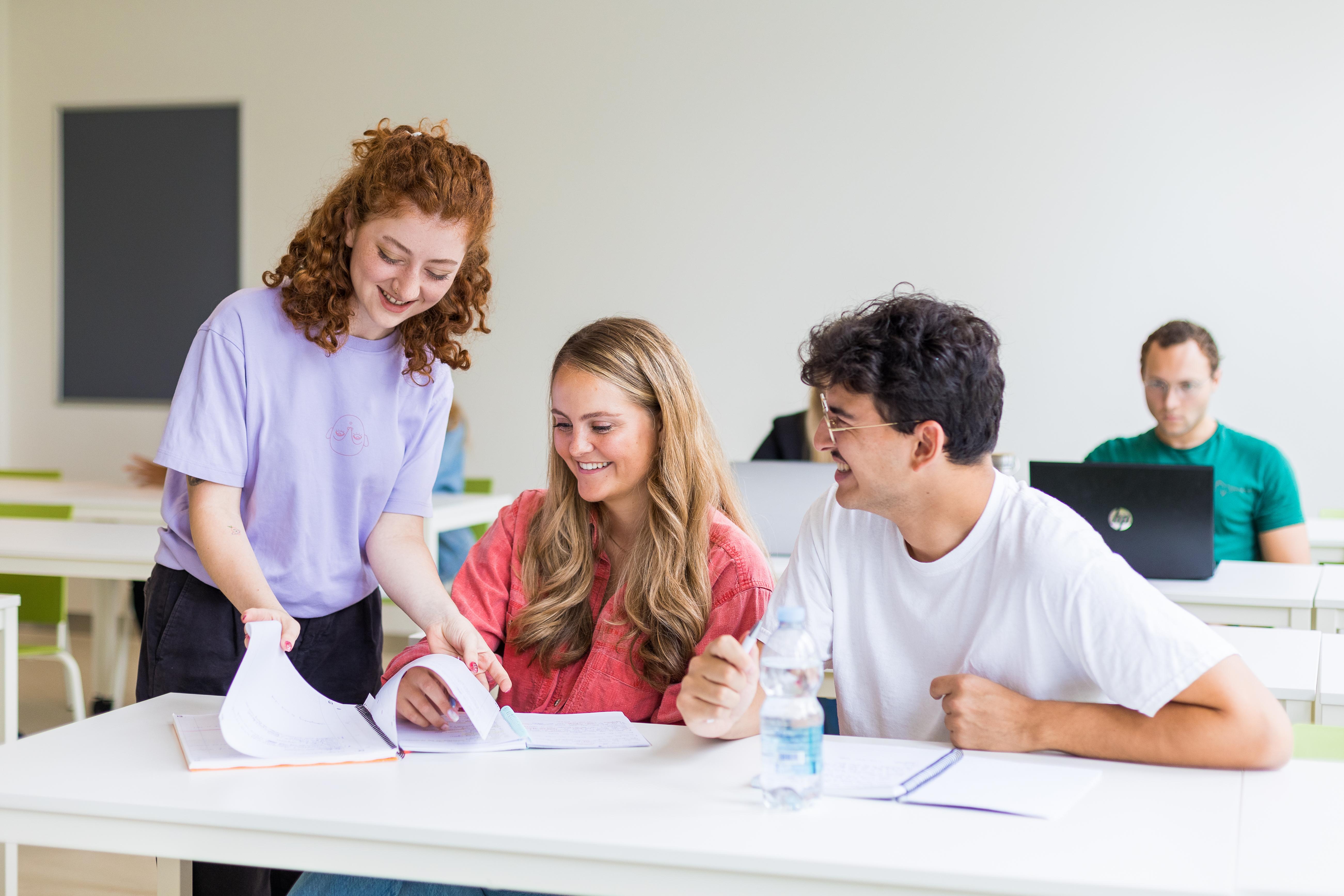
programme. The resit period varies per programme. Additional rules may also apply per programme. We are happy to refer you to the OER.
Students are responsible for registering for exams. You can register via MyStudymap from 100 calendar days before the date of the examination to 10 calendar days before the date of the examination. After this deadline, registration is no longer possible. Please note that exam registration is separate from course registration!
You must present a valid ID and your Leiden University student card (this is not your LU- Card!) at all examinations. If you can not identify yourself during an exam, your exam is invalid and will not be graded.
Examination results are published in uSis within 15 working days after the exam date.
It is not possible to deviate from the set schedule for examinations and/or resits. Students should take the examination dates into account when planning their journey back home. Note that examinations can be held even on the last day before a holiday.
• Academic calender
Within the Dutch grading system, courses are graded on a scale from 1 to 10. The formal designation of the grades is as follows:
10: Excellent (flawless; 100%) 9: Very good
8: Good
7: Satisfactory
6: Pass
5 (or lower): Fail
The lowest pass grade is 6, while grades 9 and 10 are rarely given.
Plagiarism is strictly forbidden at Leiden University and is understood as presenting, intentionally or otherwise, someone else’s words, thoughts, analyses, argumentations, pictures, techniques, computer programmes, etc., as your own work. Re-submitting or copying parts of your own work, for which you have already received credits, is also considered plagiarism. In the regulations on plagiarism you will read what the university means by plagiarism and what the possible consequences of plagiarism are.
The Course and Examination Regulations describe the content of your programme and the specialisations within the programme. They also define the achievement levels of your programme. Furthermore, they contain regulations on examinations and the order in which courses should be taken. In this way, the Course and Examination Regulations provide you with the rules you need to comply with in order to complete your studies. The regulations differ per programme.
For rules and regulations specific to the Faculty of Social and Behavioural Sciences please see: Faculty and Study Programme Regulations.
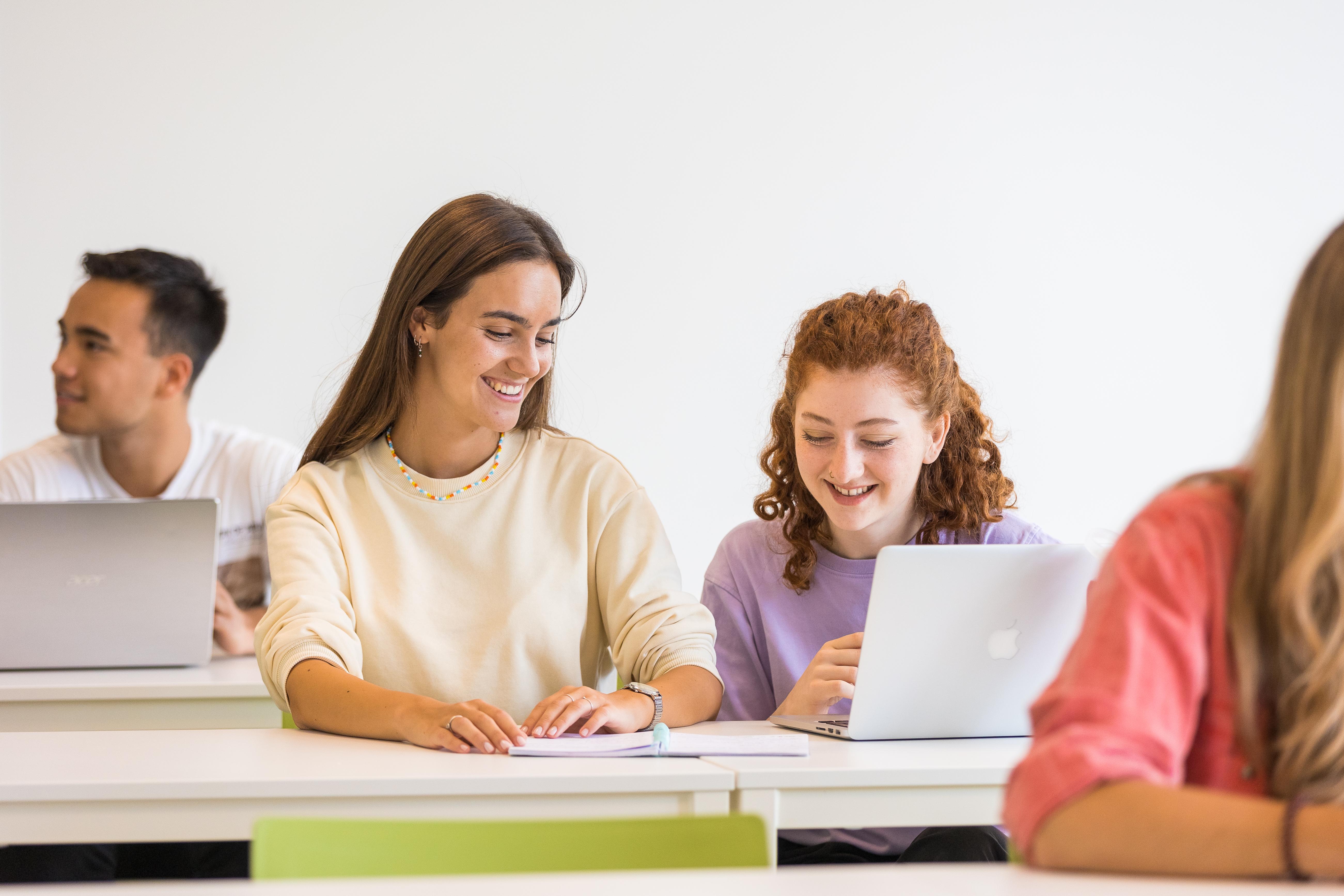
All students are obliged to have a health insurance to cover any medical costs incurred during their stay. This is a legal requirement for all temporary and permanent residents in The Netherlands. We hope it will not be necessary, but if you should need medical assistance whilst living and studying in Leiden you can find the necessary contact information on our website.
General practitioner
We strongly advise you to register with a General practioner (GP or ‘huisarts’ in Dutch) while you are studying here. GPs can only see you for a consultation if you are registered with them. You also need a GP for a referral to a hospital or specialist. You can only go to a hospital without a referral from a GP in emergency situations. We recommend the GP practice mentioned below; they accept new patients and have experience with international students.
Huisartsenpraktjk Boshuizen
• 071-531 0047
• info@praktijkboshuizen.nl
• praktijkboshuizen.nl
Hospitals in Leiden
Leiden University Medical Centre (LUMC)
• Albinusdreef 2, Leiden
• 071-526 9111
Alrijne hospital
• Houtlaan 55, Leiden
• 071-517 8178
Alrijne hospital
• Simon Smitweg 1, Leiderdorp
• 071-582 8282
Emergencies
The emergency telephone number in the Netherlands (ambulance, police, fire service) is 112. If you need to contact the police and it is not an emergency, you can call 0900-8844.
Of course, student life is not just about studying. Find out where you can grab a sandwich or enjoy a good meal after lectures. And take the time to enjoy the culture Leiden has to offer.
If you would like to like find out more about the city of Leiden, what’s on, and what to see and do, see: Leiden, Key to Discoveries
How about a workout at the University Sports Centre to recharge your batteries? The USC offers a wide variety of sports. Membership allows you unlimited use of fitness equipment and you can take any group class you want.
You can also join a student sport association. The associations provide a strong social environment in which you meet a lot of new people during sporting challenges on many different levels like badminton, basketball, running, tennis, swimming etc.
• Einsteinweg 6, Leiden
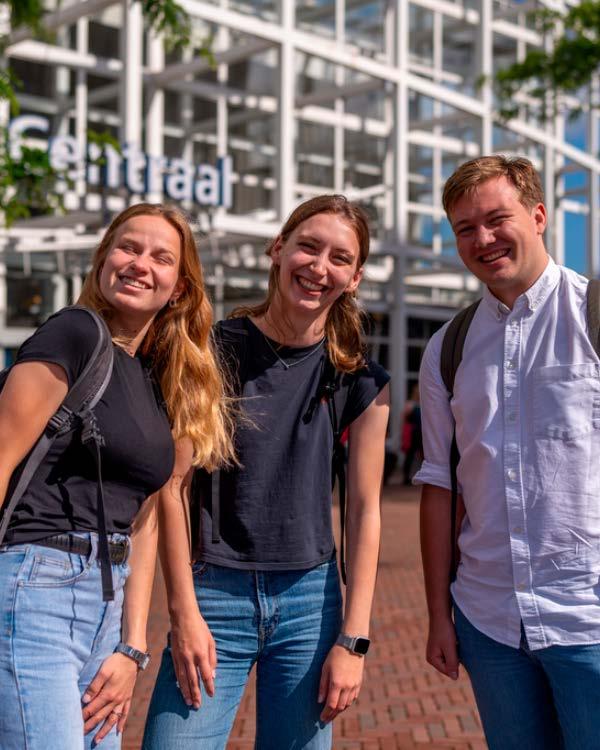
You will take 12 courses in the first year of your Psychology programme. The first year will provide a strong foundation in the broad spectrum of the discipline. In the Academic Skills Tutorial you will develop important skills such as writing an article, giving a presentation and setting up an experiment. Your tutor will teach this module and be your first point of contact. In the second semester of the second year and in the third year, you will have a considerable degree of independence in obtaining your credits. To some extent you have to fill this space within the programme with specialisation courses and electives, and to some extent you are able to fill this space outside of the programme. This can be done with electives, or by completing a minor or studying abroad. You will finish your Bachelor’s degree in Psychology in the third year with your Bachelor’s project (thesis).
You can find all the course descriptions in the Prospectus.
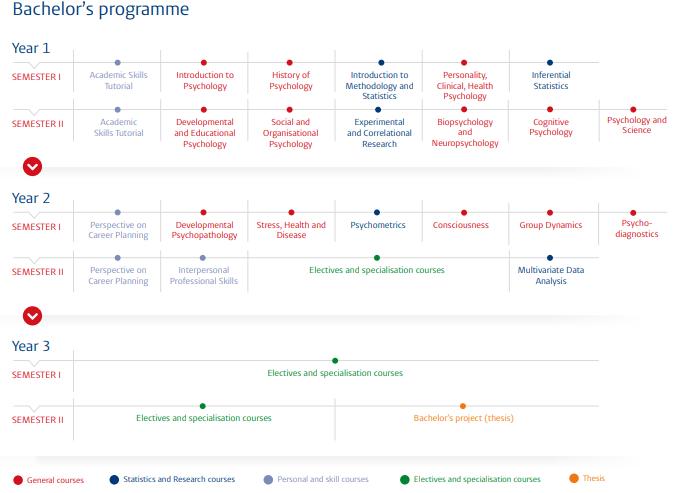
As a first year psychology student you will take part in scientific research in psychology. All first year psychology students receive a SONA account at the start of the academic year. With this account you can sign up for these experiments in the SONA system.
The log in details will be send to your uMail at the beginning of the year. If you are encountering any problems with logging in or using your SONA account, then please reach out to proefpersonen@fsw.leidenuniv.nl
In your third year you can take a minor: a specially-designed combination of elective courses. Leiden University offers more than 50 minors on a variety of themes, many of which are interdisciplinary. Examples of minors include Child Abuse and Neglect and Brain and Cognition.
Spending part of your university career overseas is a great opportunity to broaden your horizons. A university in another country may offer specialist knowledge that is not available in Leiden. During a study abroad you will experience other cultures and improve your language skills. It may also help you become more self-reliant, all of which look great on your CV. Leiden University offers exchange programmes at a large number of universities in and outside of Europe. The Exchange Coordinator can answer all your questions about an international experience.
For bachelor’s students, the best time to study abroad is in the first semester of the third year. Your preparations begin at the end of the first year and the beginning of the second year. You have to fulfill certain conditions in order to be able to apply to take a semester abroad: you must have successfully completed all first-year courses by the time you apply, and for most universities your average grade must be at least 7. The only courses you can take at an overseas university are elective courses that have been approved by the Exchange Coordinator.
• Exchange Coordinator: Romy van Keppel exchangepsy@fsw.leidenuniv.nl
Pre-master's programme
The Institute of Psychology also offers a pre-master’s programme. This programme does not offer admission to the clinical specialisations of the master’s programme in Psychology. Visit the website for more information about the programme.
Leiden University currently offers ten one-year master’s degree specialisations and four two-year research master’s degree tracks.
A maximum number of admissible students and selection procedure apply for the five mental health care related master’s specialisations: Clinical Psychology, Clinical Neuropsychology, Child and Adolescent Psychology, Health and Medical Psychology, and School Psychology.
The master’s degree specialisations are intensive full-time programmes, often with only small groups of students, and they contain the following components:
• Compulsory modules
• Elective courses (where applicable)
• Research and thesis
• Internship
You have the option to do your internship or your thesis abroad. You can find all the content-related information about the various master’s programme courses, such as entry requirements, timetables and the necessary reading material, in the Prospectus. The Prospectus also includes diagrams that show the structure of the various master’s degree programmes.
If you are an exchange student coming on an exchange agreement with the Institute of Psychology, you are invited to meet with Exchange Coordinator Romy van Keppel at the start of the semester. She will help you get settled in our faculty and to get your studies off to a good start. The Exchange Coordinator is the first point of contact for exchange students and can answer your questions, sign your paperwork, direct you to our support services and inform you about university procedures.
See our website for contact information of the International Exchange Coordinator.
As an exchange student you apply for courses or a research project in advance during the online admission process. After admission you are registered for all pre-approved psychology lectures and workgroups by the Institute. Exchange students should not try to register for courses on their own. You are also registered for the preapproved Psychology exams.
Note: if you need to resit the exam, you need to register for the second examination yourself. It is important that you deregister for an exam in case you do not intend to take it. The Student Services Centre of the Faculty of Social and Behavioural Sciences can assist students with their resit exam registration. Information about schedules, course descriptions, and course and exam admissions can be found on our website for exchange students.
You can order books from the webshop of study association Labyrint. Members of the study association buy books at a lowest price guarantee compared to other suppliers.
• Labyrint books
You can order the readers for your courses online through your Leiden University Community Network (ULCN) account.
• Reader online
You can use the MyTimetable tool to view all timetables and create your own personal timetable.
As mentioned before you can register in MyStudymap for courses and examinations.
• For bachelor’s students, the Institute of Psychology will take care of registration for first-year lectures, workgroups and examinations. After your first year, you will be responsible for registering yourself in courses and examinations.
• Master’s students must register for courses and exams themselves.
• Exchange students are registered for courses and exams by the Exchange coordinator in advance.
Registration in the digital learning environment: Brightspace
Your teachers will expect you to consult the information on Brightspace regularly to stay up to date (see page 6).
In the case of first-year Psychology students, the Institute of Psychology will take care of registration for the Brightspace module for each course in the first year. Second and third- year Psychology students will have access to the Brightspace modules automatically once they have registered for courses themselves. This also applies to master’s students.
The Board of Education is responsible for safeguarding the quality and organisation of the teaching in bachelor’s and master’s degree programmes. They set relevant guidelines and requirements and advise the Faculty Board on the content and structure of the bachelor’s and master’s degree programmes in Psychology.
• Pascal Haazebroek, Director of Studies
• Thijs van den Berg (varies) Student member Board of Education
Making recommendations and discussing the Psychology programme are the responsibility of the various programme committees:
• Bachelor’s Programme Committee (Bachelor Opleidingscommissie, BOC)
• Master’s Programme Committee (Master Opleidingscommissie, MOC)
• Research Master’s Programme Committee (Research Master Opleidingscommissie and R-MOC)
• International Bachelor’s Student Platform (IBP-ISP)
• International Master’s Student Platform (ISP)
These committees use teaching evaluations on both a large and a small scale to look critically at the programme and make recommendations to the Board of Education. To ensure that these recommendations have a broad foundation, the committee includes students as well as a teacher from each section. This ensures that students are as involved as possible. Meetings of the BOC and (R-)MOC are open to the public. (IBP-)ISP meetings are accessible for all international students. Every year in September the students of the committees are chosen and they represent their fellow students. You can apply for one of these committees and play a role in improving the programme. If you have any comments or complaints about your programme, please contact the committees by e-mail boc.psychologie@fsw.leidenuniv.nl & MOCpsychology.students@fsw.leidenuniv.nl.
The Institute of Psychology has six sections which provide the various master’s degree specialisations. Here is where to find their secretariats:
Cognitive Psychology
• Room: 2B07
• Phone: 071-527 3630
• E-mail: e.e.potters@fsw.leidenuniv.nl / ruygrok@fsw.leidenuniv.nl
Health, Medical and Neuropsychology
• Room: 2B57
• Phone: 071-527 3627 / 071 - 5275081
• E-mail: secretariaatgmn@fsw.leidenuniv.nl
Clinical Psychology
• Room: 2B30
• Phone: 071 527 3726
• E-mail: e.tisseur@fsw.leidenuniv.nl
Methodology and Statistics
• Room: 3B23
• Phone: 071-527 5370
• E-mail: secr.psy.ms@fsw.leidenuniv.nl
Developmental and Educational Psychology
• Room: 3B23
• Phone: 071-527 3644
• E-mail: secr.psy.oo@fsw.leidenuniv.nl
Social, Economic and Organisational Psychology
• Room: 2A27
• Phone: 071-527 3824
• E-mail: seo.unit@fsw.leidenuniv.nl
Our Study Advisers are available to help if you run into difficulties, such as having to delay your study progress, or to discuss questions about things like study planning and examination regulations. Contact your Study Adviser by email to make an appointment. Please see the Bachelor Contact Page and the Master Contact Page for additional information.
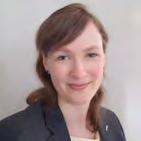
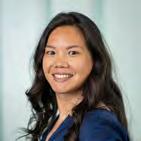

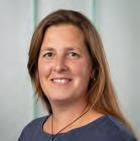
Kim Minnebo
• Study Adviser for the Dutch track & part-time students
• studieadviseurBScPsy@fsw.leidenuniv.nl

Jolien van Barlingen
• Study Adviser for the Dutch track
• studieadviseurBScPsy@fsw.leidenuniv.nl
Jacintha Soeharsono-Nimbita
• Study Adviser for the Dutch track
• studieadviseurBScPsy@fsw.leidenuniv.nl
Fleur Vermeij
• Study Adviser International Bachelor in Psychology (IBP)
• StudyadviserIBP@fsw.leidenuniv.nl
Jennifer Martin
• Study Adviser International Bachelor in Psychology (IBP)
• StudyadviserIBP@fsw.leidenuniv.nl
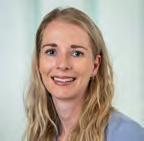
Master


Merel van Beem
• Study Adviser International Bachelor in Psychology (IBP)
• StudyadviserIBP@fsw.leidenuniv.nl
The Board of Examiners is responsible for safeguarding the quality of tests and examinations, and the quality of their procedures and organisation. It establishes rules and regulations for this and oversees if these are complied with. The Board of Examiners is also responsible for granting exemption from one or more examinations. Do you have a request for the Board of Examiners?
Mirthe Haas
• Study Adviser for international master’s students
• 06 34 16 11 64
• mhaas@fsw.leidenuniv.nl
Jack Wiltjer
• Study Adviser for Dutch master’s and all pre-master’s student
• 06 34 16 11 57
• j.h.wiltjer@fsw.leidenuniv.nl
Make sure to include sufficient supporting arguments and evidence when you submit a request. Requests for exemptions and electives must be submitted via uSis. If you want to submit several exemption requests, you should first ask your study adviser for advice. For other requests, this web form must be used. Your request will be processed during the meeting of the Board of Examiners.
All regulations and guidelines can be found in the Course and Examination Regulations for Psychology and in the Regulations and Guidelines of the Board of Examiners for Psychology.
Leiden University gives you great opportunities to make the most of your time as a student. Do you have time and would you like to use your talents? If so, you could become a student helper, join a committee or spend a year on the board of study association Labyrint, SPS-NIP, a sports club or a student club. Taking on a volunteer position during your time at university is a great way to build up relevant experience for your CV, and to have an unforgettable time with your fellow students.
A relevant part-time job or voluntary work can also help you to develop, both in terms of your skills and as a person. Take a look at the studyinnl.org website to read about working while studying as an international student. Participation is an important democratic right. You can contribute to the decision-making process and make recommendations at several different levels (programme, faculty, university or national) on all matters affecting the teaching and organisation at Leiden University. You will also learn a lot from it. If you think this is for you, consider becoming a student member of the Board of Education of the Institute of Psychology or joining a Programme Committee (BOC or MOC), the Faculty Council or the Institute Council.
Psychology student ambassadors answer all sorts of questions prospective students have – maybe they can help you, too. They are also frequently looking for student helpers or volunteers to take part in fun communications activities.
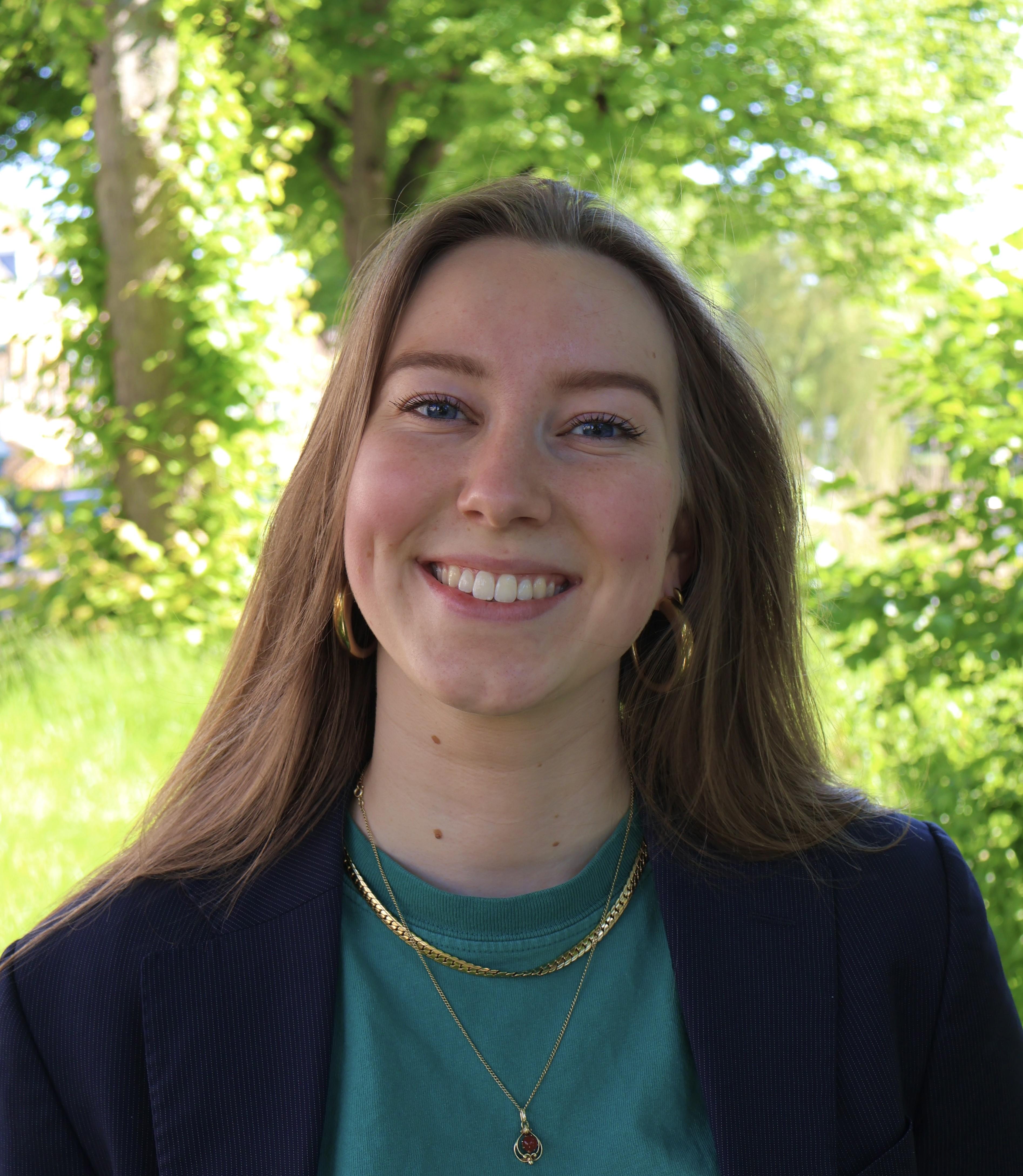

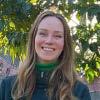
Student Ambassador for the Dutch Psychology track
• Yara Hage
• ambassadeur.psy@fsw.leidenuniv.nl
Student Ambassador International Bachelor in Psychology
• Arsine Ghukasyan
• ambassador.intpsy@fsw.leidenuniv.nl
Student Ambassador Master’s degree programmes in Psychology
•
• Emma Fraterman ambassador.mscpsy@fsw.leidenuniv.nl
Study association Labyrint
Study association Labyrint is there to help you during the time you study Psychology at Leiden University. As a member of Labyrint you get a discount on textbooks, summaries, tutoring and on all the activities of Labyrint. But there is more than just discounts! Labyrint also organises various activities: from lectures and congresses to parties and social activities. These activities are the best way to get to know your fellow students and make friends for life. Labyrint has few obligations, so you can decide for yourself how active you become within the association.
Where will you end up, and what do you find interesting? Leiden students from the Dutch Association of Psychologists (Nederlands Instituut van Psychologen, NIP) organise activities that motivate students like you to explore their future possibilities. You may already know exactly where you are going, but perhaps you have not worked out the best way to get there yet. That is where NIP’s Psychology Students Section comes in. These students are in direct contact with psychologists working in the field. Become a member and take a look at the internship possibilities, or introduce yourself to one of their professional coaches.
• Study association Labyrint
• NIP Students Section
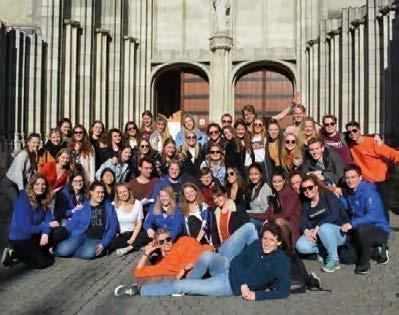
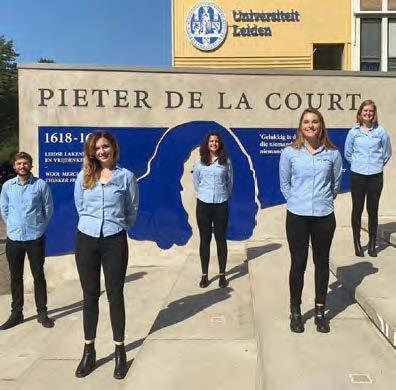
•Read inspiring psychology-related blog posts. Your lecturers and fellow students write about psychology in day-to-day life at the Leiden Psychology Blog.
• Follow us on Instagram and see what students, teachers and alumni are up to.
Some Dutch words and phrases to help you make your way around:
Dag, doei
Goodbye (friendly)
Hallo, hoi
Hello
Prima!
Alright! Let’s do it!
Ja Yes
Nee No
Tot ziens
Goodbye (formal)
Patat met
Chips/fries with... (mayonnaise, ketchup, etc.)
Gezondheid
Bless you (when sneezing or coughing)
Proost
Cheers
Gefeliciteerd
Congratulations
Veel success
Good luck!
Gezellig
Fun, nice, cosy; used to describe a good time with good company in nice surroundings
Leuk
Nice, like ‘Oh, nice!’
Dank je wel, Bedankt
Thank you
Beterschap
Hope you get well soon
Mooi
Pretty, good
Alsjeblieft
Please, and here you are
